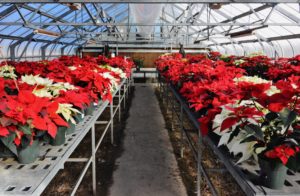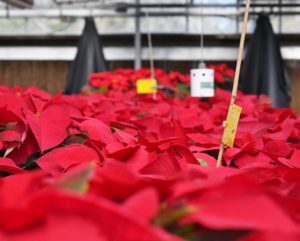Give poinsettias a healthy home for the holidays and beyond
- Writer: Adam Russell, 903-834-6191, [email protected]
- Contact: Dr. Brent Pemberton, 903-834-6191, [email protected]

OVERTON – The bright, crimson red holiday ornamental plant staple – the poinsettia – has a few needs to help it thrive throughout the holidays, according to Dr. Brent Pemberton, Texas A&M AgriLife Research ornamental horticulturist, Overton.
“Poinsettia care for the holidays is pretty straightforward,” he said. “When people pick them up, they’re ready for display, but there are a few things you want to keep in mind to make sure you get the most out of the plant for your holiday displays.”
Pemberton said poinsettias shouldn’t be overwatered.
“Water when the soil surface is dry to the touch, and don’t let them stand in water,” he said. “Soil should be moist and well drained.”
Poinsettias prefer to be out of direct sunlight, but rather prefer bright, filtered light, Pemberton said. They won’t last as long if conditions are dark.
He said they also prefer cooler temperatures, 65-70 degrees, but if temperatures dip below 60 degrees, plants can sustain chill damage.
Pemberton said no fertilizer is necessary after the plants bloom.
“They are flowering, so just enjoy them through the season,” he said.
Poinsettias are tropical perennial plants, but most people discard them each year. However, he said, if plants are kept, there are steps to take to ensure they flower next holiday season. And plants should be transplanted into a size larger pot.

Pemberton said plants should be cut back after the holidays. The plant’s stem should be trimmed just below the flowering portions, including the decorative red bracts, which are modified leaves.
“Cut them back and they will begin to grow,” he said.
Plants should be watered and fertilized as necessary to support regrowth, he said.
“Using liquid fertilizer at recommended rates on the package will be fine,” he said.
Plants can be placed outside through the summer but should be placed in a shady area, Pemberton said.
Poinsettias are tropical plants, Pemberton said. In the fall, plants should be brought inside before temperatures dip below 60 degrees. Around Oct. 1, plants should be in total darkness between sundown and sunrise.
“Any artificial light will cause them to grow vegetatively and not flower,” he said. “It’s hard to get them to flower again because any light from a parking lot or indoor lighting can disrupt flowering. But they are perennials and can be enjoyed for many holidays if properly maintained and proper steps are taken to promote flowering.”


